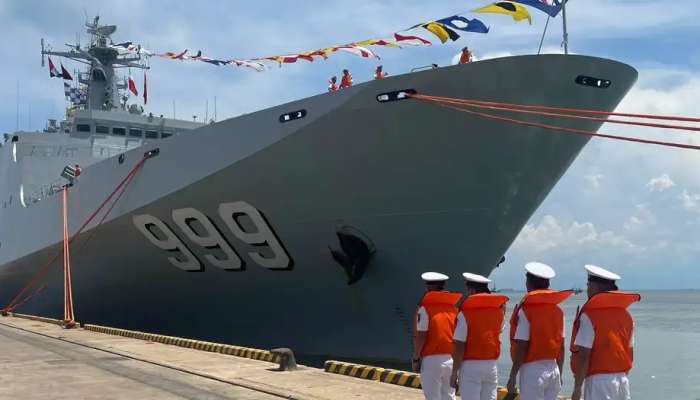
Kuala Lumpur: As global powers vie for influence in Southeast Asia, the Association of Southeast Asian Nations (ASEAN) is renewing its push towards nuclear disarmament.
The ASEAN has long urged China, the US, the UK, Russia, and France to sign the Southeast Asia Nuclear-Weapon-Free Zone Treaty (SEANWFZ) accords. Adopted by ASEAN in 1995, the SEANWFZ (also known as the Bangkok treaty) aims to keep the region free of "nuclear and other weapons of mass destruction" while allowing for civilian use of nuclear energy.
Following the ASEAN Regional Forum in Kuala Lumpur last week, the bloc's current chair Malaysia urged nuclear powers to "recognize the need to completely eliminate nuclear weapons."
Beijing has already confirmed it will endorse SEANWFZ, according to Malaysian Foreign Minister Mohamad Hasan.
"China made a commitment to ensure that they will sign the treaty without reservation," Hasan told reporters on the sidelines of an ASEAN diplomatic event last week.
Will US and Russia also join SEANWFZ?
Hasan also indicated that Russia, which owns the world's largest nuclear arsenal, will sign the agreement as well.
While Moscow has yet to comment on the issue, Russian Foreign Minister Sergey Lavrov visited Malaysia in early July for a series of high-profile meetings.
US Secretary of State Marco Rubio was also in Kuala Lumpur last week for several multilateral and bilateral talks. However, it remains unclear if the US intends to sign the SEANWFZ.
Both Washington and Moscow are keen to secure their influence in the region, including in the field of nuclear energy, as several ASEAN states are looking for outside partners to develop civilian nuclear programmes.
A fading global order
Partnerships with Washington, however, may not be as reliable as they once were. President Donald Trump's administration is pursuing a mercurial and shifting foreign policy, leaving Southeast Asia with the general sense that the rules and norms of the international order are crumbling, and the US' credibility and interest in the region are fading fast.
Most Southeast Asian countries have reacted by advancing relations with Russia and China over the past few months, recognizing that Lavrov, Russia's top diplomat, may be correct in saying that the international community is fragmenting into a "multipolar world order."
This leaves room for China to expand its diplomatic clout at Washington's expense. By endorsing the SEANWFZ, Beijing wants to show that it "cares about ASEAN at the same time as the US is potentially tariffing Southeast Asian states and trying to use them to isolate China, which they don't want to do," Joshua Kurlantzick, senior fellow for Southeast Asia at the Council on Foreign Relations, told DW.
"China loses nothing because there's little likelihood anyway it would need to use nukes in Southeast Asia," he added.
Also, Beijing can now emphasize the contrast between its own policy and the AUKUS pact involving the US, the UK and Australia. The agreement between the three nations allows for the use of nuclear-powered submarines in the Asia-Pacific.
China deploying submarines in South China Sea
Zachary Abuza, a professor at the National War College in Washington, told DW that "China will absolutely not abide by the terms of the SEANWFZ."
The SEANWFZ treaty commits its signatories not to move nuclear weapons through the region or its waterways. In recent years, however, China has been accused of "bunkering" its submarines in the South China Sea, a contested maritime area that several Southeast Asian states dispute with Beijing.
In 2023, the Reuters news agency reported that China had begun to keep at least one nuclear-powered ballistic missile submarine at sea at all times, with many patrolling the waters from Hainan to the South China Sea.
Last year, the US military asserted that Beijing was preparing to deploy floating nuclear reactors near the artificial islands it has reclaimed in the South China Sea.
Beijing wants to portray itself as reliableChina is believed to possess hundreds of operational nuclear warheads, and — according to the Pentagon — continues to expand its nuclear arsenal.
"But that Beijing is willing to be the first outside nuclear power to sign the SEANWFZ is diplomatically smart and at least pays lip service to ASEAN centrality," Abuza noted, referring to the concept that ASEAN should be at the heart of broader Asia-Pacific diplomacy.
"China is doing everything it can to portray itself as the responsible stakeholder in the region, committed to rules and norms. Beijing wants to paint Washington as the disruptor of the status quo and economic growth in the region," Abuza said.
For political scientist and founder of the weekly ASEAN Wonk newsletter Prashanth Parameswaran, proper non-proliferation efforts would require more than just signing the SEANWFZ treaty.
The vision of a regional nuclear-free zone has "historically carried normative weight" among some ASEAN states, including Malaysia, he told DW.
However, Parameswaran points out that "no one in the region is under the illusion that this alone will necessarily restrain what nuclear powers will do or reverse the worrying state of the nuclear non-proliferation regime more generally."